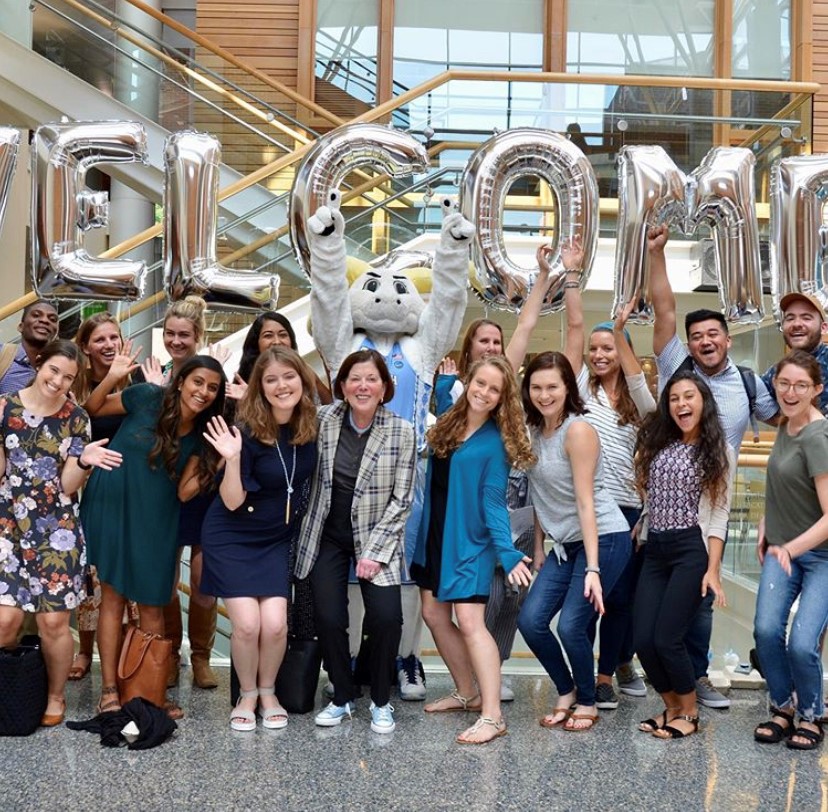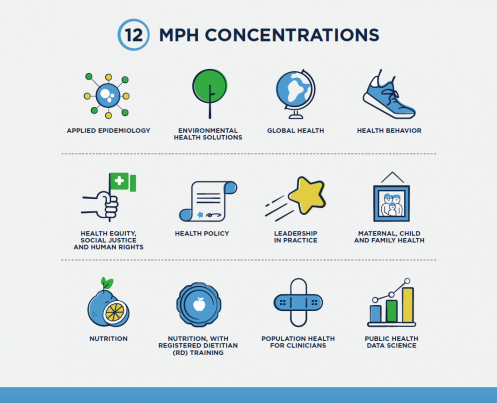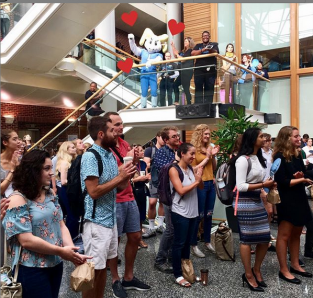New academic year, new concentrations
The Gillings School has some of the greatest public health students anywhere. I love meeting our students during the first week of classes, when they are new and ready for the public health adventure.
Related Posts

Above, Rameses and I posed with a group of new MPH students. (The students look great, don’t they? And Rameses, too!) Below, new students gathered for welcomes by school leadership, including our student leaders.
Last year, we launched new integrated, problem-focused core courses. Students from many disciplines come together to take these courses, thus addressing one of the limitations of past core courses—that students felt they did not meet and work with their counterparts in other areas.
Another innovation: this year, for the first time, our MPH students had 12 concentrations to choose from (see figure). Many, including Global Health; Data Science; and Health Equity, Social Justice and Human Rights, span multiple disciplines.

Most of the public health students of my generation came to the field from a variety of directions, such as Peace Corps, but more often, by chance. For me, it was serendipity. Few of us grew up wanting to be in public health, and many of us, as young women, were programmed to become nurses, teachers and social workers – all good professions but not necessarily what we wanted to do. I am impressed by how intentional Gillings School students are, and how informed they are about what they want to do. Sunday afternoon, I was working in my office and answered a call from a UNC freshman, interested in health policy, who wanted to know if she could apply to the Gillings School as a freshman. She couldn’t wait! With the assured admission program in which we now participate, high school seniors can apply to our BSPH programs in health policy and management, biostatistics, environmental health sciences and nutrition. I am confident the world will be a better place because of this generation of students. Go Tar Heels!
Students to the rescue
We need our students to take on some of the world’s greatest challenges as they mount and intensify. No matter what the administration in Washington says: climate change is one of the greatest threats facing the world, and the G7 group, except for our president, knows that it is in their best interest to tackle climate issues. The World Health Organization (WHO) recognized air pollution and climate change among the top 10 threats to global health in 2019 and stated that “climate change is already impacting human health, and has become the largest health crisis of our time.”
Right now, in the U.S., there are numerous pressing problems, many of our own making. Who would deny vaccination for infectious diseases to immigrants detained at the border? Do the people who make the rules understand that anyone working in those apparently squalid, overpacked facilities could fall victim to an infection and spread it far beyond the detention center? It won’t just be immigrants who get sick and die, although that would be bad enough. Then, there is the administration’s effort to roll back the Flores Settlement Agreement, passed in 1997, which says immigrant children must be kept in the least restrictive setting and generally shouldn’t spend more than 20 days in detention. This is a cruel, heartless attack on children and families by people who, in the past, have said they are pro-family. Putting families into indeterminate detention, in places that reportedly are unfit to house children and families, is not family friendly. It’s cruel and unusual punishment in my opinion, seriously harmful to children’s health and development. (For a discussion of this in The New York Times, see, “Opinion: What Will Indefinite Detention Do to Migrant Kids? The evidence is clear: No detention center is safe and healthy for children.”) Currently, 19 states have sued the administration to prevent the rollback. Kudos to them. I’ll stop there for now.
We and other schools are educating students who will be front-line professionals in battles against climate change and disease and in support of health promotion, safety and the equitable provision of health care. They will need all the knowledge and skills they will acquire in school and throughout their careers and the courage to stand up for what is right. Knowledge without courage will be insufficient to right the wrongs created in the past several years.
Barbara

